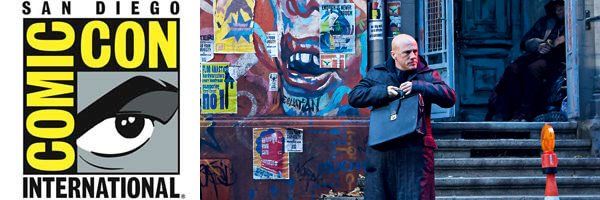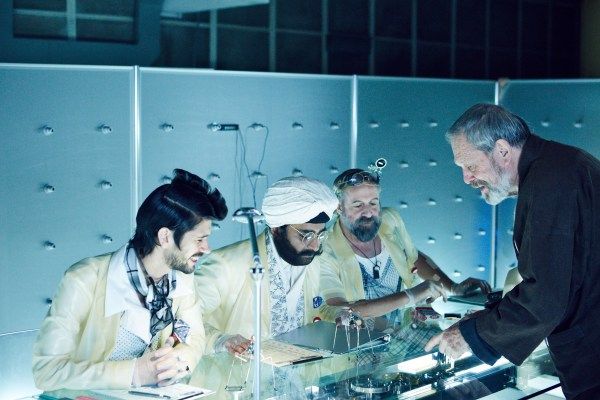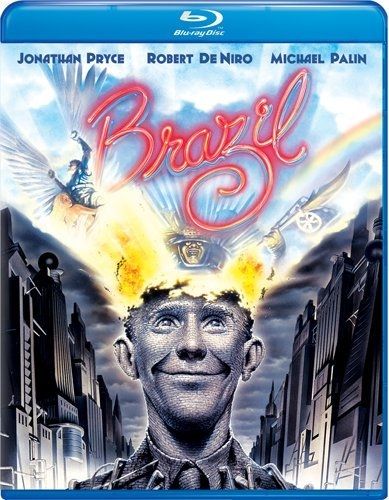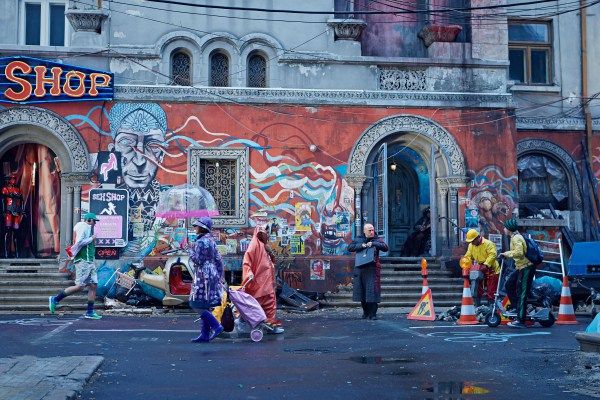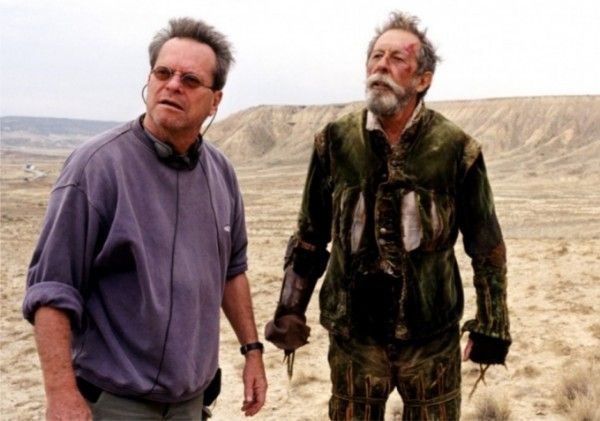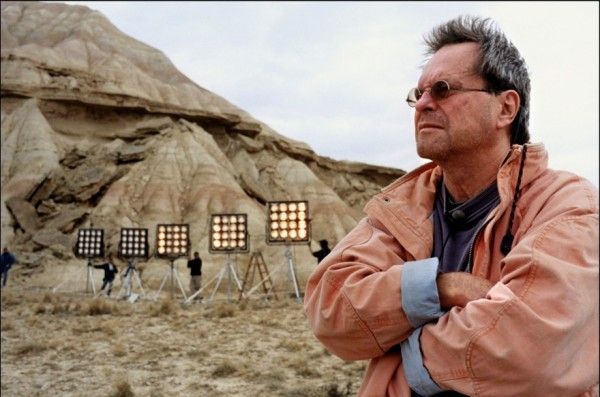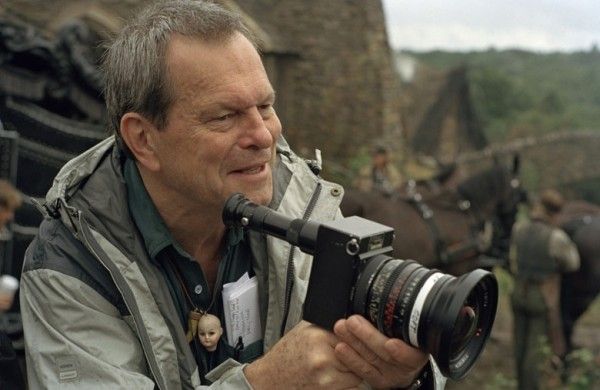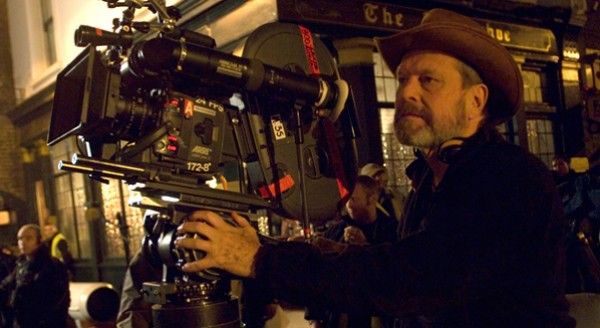Terry Gilliam’s The Zero Theorem opens later this year and the film’s producers Dean Zanuck, Zev Foreman, and Amy Gilliam were at this year’s Comic-Con to show the first footage and to take questions from fans in Hall H. The film stars Christoph Waltz as Qohen Leth, a computer hacker who searches for the meaning of life while being distracted by Management (Matt Damon), a shadowy figure from an Orwellian corporation. It definitely sounds like a Gilliam film and the images that have popped up seem to confirm that Gilliam’s trademark imaginative style will be on full display again. Collider got to sit down with the producers of the film for an interview where they discussed how it’s like making a film with an infamous director, if Gilliam would ever venture into television, and the troubles that come along with producing a film that is so outside of the box. You can hit the jump to read more.
How did you each get involved with this project?
Dean Zanuck: I was probably the first to get involved. The University of Central Florida’s creative writing professor…this was the first script he had written and he sent it to me about 10 years ago. My assistant was actually the first one to read it and she recommended it to me and it turns out that this is the only time that anyone who has ever worked with me has recommended something where I actually said, “Let’s do this.” It has always come to me first and has been my decision. Unfortunately, she is not with the company anymore [laughs] No, she is…
Zev Foreman: Did you give her a special thanks or something?
Zanuck: She is in there. She identified a great piece of original screenwriting. There was work that needed to be done on the script and that is where we all rolled up our sleeves with the screenwriter, Pat Rushin, and got it to a place where we felt that it was strong enough to submit to directors. My dad, Richard Zanuck, had a really nice relationship with Terry through their time spent together in London. He thought that Terry would be ideal for this. My dad didn’t develop the script but he wanted to help his son out who was working at the company at the time. He would stalk Terry a bit. Terry couldn’t get through any dinner without my dad bringing it up. I’m sure Terry was like, “I know it is coming. I know it is coming up soon. He is going to bring up The Zero Theorem.” That was probably 5 or 6 years ago when Terry first read it. He was busy with Don Quixote and The Imaginarium of Doctor Parnassus and just through some sort of cosmic collision of events we had a financier in Voltage. Nicolas Chartier, who is one of the other producers, is a huge Terry Gilliam fan. We actually had a go with Billy Bob Thornton and Terry way back in the day and it never got off the ground. Not “thank god” because Billy is a great actor but we really lucked out. Sometimes I believe when you are on a project for 5 or 10 years, which I am, that the right people ultimately end up with it. We even went to a couple of people before Christoph Waltz but thank god that they said no. We got Christoph and the rest is history.
Foreman: I guess then I would be next since I am the Voltage of it all. I think as Dave said, Nick is a huge Terry fan. The second he had the opportunity to be able to work with him that is all it took. We read the script and it is a quirky kind of beautiful piece. It is the type of thing that a company like ours…we like to take risks and we thought that this was a risk that was worth taking. I think it has and will continue to pay off. It is a beautiful movie and we are really happy to be involved with it.
Amy Gilliam: And I got to be involved because thankfully somebody employed my dad again. [laughs] I got to come along, support him, and help him through the adventures that these guys made happen.
The writer, Pat Rushin, has said that he was influenced by Gilliam from the get go. Was it always envisioned as a Gilliam project or something that you would hopefully be able to approach him with?
Zanuck: When the writer, who was just a professor of creative writing, first sort of had this hair brain idea for The Zero Theorem he went to the library to check out a few screenplays. I guess you can still do that and one of the first screenplays he checked out was Brazil. It definitely must have gotten inside his head because there are a few echoes of that in this. We danced around with a couple of other would-be directors but it was silly for us to think that there was anybody else on the planet that could have made this. That is really the truth. I don’t know who else could give it the size, scope, emotion, and humor. That screenplay, as you guys know, could be a small, dour, little, meaning of life piece. But this is big even though our budget wasn’t very big. It feels very big.
Sadly, very problematic productions are synonymous with Terry Gilliam. It feels like this time he had some liberty and creative freedom. Can you talk about how it is like to approach a director that you know has had problems in the past. Do you try to make him feel as comfortable as he can and how do you do that as a producer?
Zanuck: It starts with Zev’s company and Nick Chartier. I think they are likely the only or one of the few financiers/producers who would actually get excited about a Terry Gilliam movie because of that checkered past. Some maybe of his doing and some completely out of his hands. But it sort of hit at a perfect time. Don Quixote had hit another snag and here Terry had an opportunity to get involved with a script that he had always liked and responded to. And there was a financier saying, “Here is a small amount of money, but is much smaller than what you are used to dealing with.” But I think it is a real testament ot the team and Terry just working within our boundaries. Yes, directors – and certainly Terry – are always trying to push those boundaries but we found a way to get everything we needed on screen. Terry was one of the first to say that he didn’t think or know that we could do it but he pulled it off and I don’t think he looks back and says, “Oh, I wish I had more money.” I don’t think it has even crossed his mind. He showed up in Romania and kicked butt. He got people to work really hard and Zev made some incredible deals.
One of the things that I find very interesting about Terry Gilliam is how even when he doesn’t write the screenplay himself there is definitely still a Gilliamesque to touch to everything. How is that process like where he starts to transform everything to fit his vision?
Gilliam: Well, I think that even the screenplays that he hasn’t written at the beginning he has gotten very involved in. He has never really just taken a script and just gone off and made it. He has taken that script and started working on it himself so that he can put his vision into that script. Starting with adding to the scenes, changing dialogue, expanding the characters to fit his brain and where his creativity comes from. It really starts the minute that he gets a script and it carries on transforming all the way through it. It is a never ending process. Even when you think that you have shot a movie, you get into post production and he is still transforming and creating that script. So whether it is his to begin with or someone else’s, I think his mark goes on it at the beginning.
I have to imagine that he does get a lot of screenplays sent to him. What is it that will make a certain project click with him? What is it that attracts him to a certain screenplay or project?
Gilliam: That is a hard question because really and truly he just wants to make the things that he wants to make, which he has inevitably written. Sometimes it is maybe out of desperation because he doesn’t think he will make a movie again [laughs] and someone handed him a script and some money and he ran with it. Other times, it is because of a writer or he is passionate about a project that he can get involved with and he can visualize it. It is very hard for him to pick up other people’s scripts and go with it. It doesn’t happen very often as we have seen.
Is he by any chance developing anything right now where Voltage might come into play now after having this good experience with them?
Gilliam: He asked me. [laughs]
Foreman: And you haven’t sent me anything. [laughs]
Gilliam: I know. Terry is always willing to dig up. Obviously, he is going to make Don Quixote.
I hope so.
Gilliam: Absolutely. The fans are rather waiting. So we don’t want to let him down. So that is sitting there. He has a couple of other scripts like Good Omens and Defective, Detective are all ones that he has written that were kind of left behind that he is picking up again. Maybe he will surprise us and write something brand new.
I feel like we are at a point in film culture where he is very beloved and now we are getting companies, like Voltage, that look at him in a sort of way and they say, “We want to work with this guy.” because they know the legacy and they know the story behind Gilliam. Do you feel now that there are so many alternative options like VOD, Netflix, or this current great era of television that we are getting that we might see Gilliam try another format out?
Gilliam: I don’t know. That is really hard. We speak about it. “Why don’t you make that film into TV? Why don’t you do this?” It is something that I think he finds very difficult – to make a film, cut it up, and make it longer for TV. There are discussions that we have had but he hasn’t been convinced yet. He wants to make movies for the cinema. What is interesting is the incredible amount of supporters that he has through his fans and now they have things like Kickstarter and what have you. Maybe there is a place for Terry to go and raise some finances there if he needs a bit more money.
You just came back from your Hall H presentation. Are you surprised by the amount of fans he has and that they love him as much as they do?
Gilliam: Yeah, this is what I always say to him. Terry is much darker in the sense of “Nobody likes me.” He started his own Facebook page after many years of not wanting to be on there. Last year I set it up for him and it is brilliant because it is a place where he can go and communicate and feel loved. He can see that there are people out there that love and like his work and they are really passionate and behind him. That is what I was saying to these guys and why I filmed that experience. He was here a few years ago with Doctor Parnassus but there is nothing better to feel and see your fans cheering you and to know that they are there. That is an incredibly special thing and it is something that we have to keep reminding him of.
It feels like genre films have become the norm now and Terry Gilliam has always been making genre films since he first started directing. Do you feel that it is easier now for him to make films or have meetings than before because his films are so genre friendly?
Gilliam: I would like to think so. I would like to think that more people want to get involved in a Terry Gilliam film. Each one is always an experience. You’ll never have a dull moment.
Have you seen it get better and more optimistic for him in the last couple of years?
Gilliam: I don’t know. He would say that it feels like going back to square one every time, and he is probably right. It’s not an easy…we all know who Terry Gilliam is and we all know what he does. He does something magical, creative, and outside of the box. But people like to put things in boxes because it makes their lives easier and simpler. I think we need to keep putting things outside the box and make your audiences see things which are much more about exploring and are interesting.
That is something that I am very interested in: How do you sell a Gilliam film? They are so creative and you really can’t truly capture the kind of experience that one of his films are in a trailer. How do you as a producer and as a studio sell a film like this?
Foreman: I think that you have to understand that there are people that are attracted to those types of films and there are people who are not. You know, a Terry Gilliam film is not a studio blockbuster movie and it is not a movie that is meant to be for everyone. Once you sort of embrace and cater to it, and speaking back to what Amy said about Terry’s fans, that is who are making a movie for. You are making a movie for people who love those types of movies, whether it is a genre movie, a movie that is a magical, or an existential movie. I think that if you kind of go into it with that mindset then you almost can’t lose in that way. You’re not trying to make a Terry Gilliam movie into a huge blockbuster. You are trying to make the best Terry Gilliam movie that you can and with that it will bring success.
Was there anything that he tried to sell you where you said, “I can’t even imagine this.” and then he somehow pulled it off? I have to imagine that some of his ideas sound so outside the box on paper. How do you see this wildly creative side of Gilliam as a producer who has to also be the guy that has to set limits?
Foreman: I think the thing about Terry that we experienced, and I don’t know if this is true of every movie or not but it is definitely for this movie, is that it is not necessarily that Terry approaches you with one idea that kind of blows you out of the box. He comes up with an idea that is interesting and amazing. Then he builds on that idea and builds on that idea and continues to build on that idea. It’s an idea that is continually layered and creates more and more depth until you have gotten something that is so fantastical and this world creation that he does. So it is not this sort of one punch. It is something that sort of builds over time. The way his brain works and kind of goes through these levels and layers until you finally get to a place where it is full. I think that is the best way to explain it.
Gilliam: Or time is up. [laughs]
Foreman: Exactly. You get to a place where you just have to stop because we can’t keep going forever. If he could he would probably keep going forever. [laughs]
Gilliam: Yeah, exactly! [laughs]
Are you trying to approach more auteurs and to make your company more auteur friendly? Are you trying to get more people like Gilliam involved with your company?
Foreman: I think our company is super auteur friendly already. I just finished a movie with William Friedkin, we did The Hurt Locker with Kathryn Bigelow, now we have done Terry Gilliam, and we did Robert Redford. I think we are very auteur friendly already. [laughs]
I did see the impressive list of films that you have produced. Are you approaching this as a film fan who wants to work these directors? How do you approach working with these big directors?
Foreman: I think Nicolas, who owns our company, is a huge cinephile and he definitely approaches films with people that he loves to work with. A few of those films, and actually most of the ones that I just mentioned, come from a place of wanting to do a movie with these people and asking them what they want to be doing. It’s starting from there. It is not about seeking them out and saying, “I have a great piece of material and I want to find this person.” It is almost the other way around. It is seeking the person and asking, “What can we do for you?”
It does feel like there is something special going on at Voltage. Killer Joe was fantastic and so was The Hurt Locker. It does feel like there is a sense of trust and freedom with the directors you work with. But yet you are a producer and you certainly have to put some limit to these directors. How do you decide where to set your limits while still being director friendly?
Foreman: I like to think, and I’m not sure that all of our directors would agree with us, that we are a very hands off director friendly type of company. But there is a limit to that, obviously. In the end, you still have to try to bring a movie in on time and on budget. You have to deliver it to your buyers and there is the other side of the business, which is not a purely creative sort of “whisk off into to the woods” thing, where you see what they figure out and see what comes back. So I think that we really try as hard as we can and whenever we can to be deferential to the vision of our directors. We try to give them all of the tools they need to make their vision, but at the same time you also have to…not to go against what Amy said, but we have to create some sort of box. We just try to make the barriers really, really wide.
Ms. Gilliam, you have a lot of technical background in film. You were a camera assistant among many other tech jobs. I know that you started off as your dad’s assistant but can you talk about how you became involved with that side of filmmaking? What made you want to learn more of the craft behind filmmaking?
Gilliam: What happened was that all of my life I was never going to be in this film industry. I definitely did not want to do what my parents did until I went and worked on the set of Fear and Loathing in Las Vegas in the costume department. It was pretty much the coolest thing, the most fun, and the best time when you are studying in London. It was then really for me that I wanted to explore all avenues and I wanted to figure out how everything worked. I wanted to see everything and be hands on. I started by loving photography. I was like, “Well, what department is right in the center of all the action and has to be there all of the time? Camera.” So I convinced Roger Pratt, a cinematographer that has actually worked quite a lot with my dad, to take me on his movies. I became his trainee and worked my way through camera. I did that for about 6 years and just moved to becoming an assistant on things like Tomb Raider and after that I did some other things. I just like to explore because I knew that one day wouldn’t it be great to produce a film? I wanted to know what everyone did so that I could figure it out.
It definitely feels like you are and were learning an appreciation of the craft before tackling something. It feels like a resume that is building up to something. Is producing more films the dream goal or would you like to write or direct a film?
Gilliam: I don’t think it is my dream goal anymore. [laughs] Up until I started, I was my dad’s assistant. When I finally…in my mind, I wanted to produce a film for him, which I did as my second film. It was probably the hardest thing I have ever done or experienced, which was The Imaginarium of Doctor Parnassus. I still enjoy it and I still want to find young directors because I really love to see someone’s creative vision put on screen. I like to facilitate all the things that need to be done in order to do that. Am I going to do something more creative myself? Maybe, but not yet.
Whose decision was it to bring the film down to Hall H and to Comic-Con?
Zanuck: It was Terry’s wasn’t it?
Gilliam: It was Terry. Terry had been here a few years ago with Parnassus and a good friend reminded him that Comic-Con was on again, and what a better place to bring his new movie and to start sharing it with his audience?

